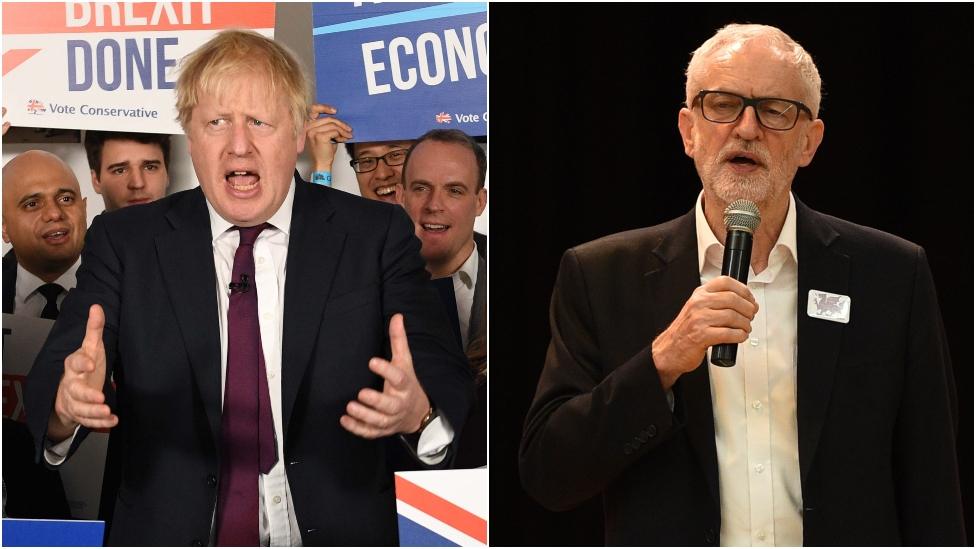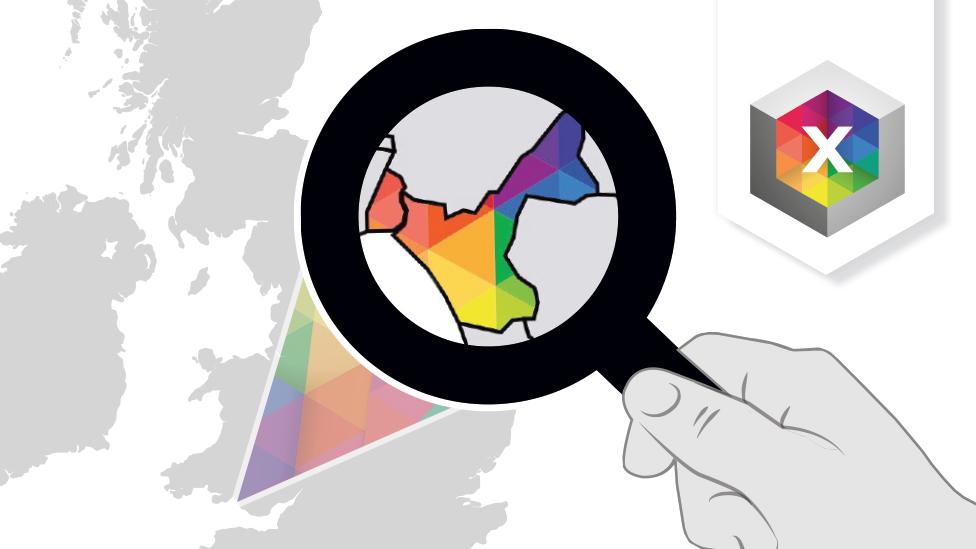General election 2019: Will the parties pull off their experiments?
- Published

Forget Brexit.
It may be the reason and the backdrop for this election, but aside from the central question, the results on Friday morning will yield the outcome of two big political experiments, set up by the political parties.
If either succeed, our politics will have changed profoundly.
First off, the Conservatives are trying to win in places where they have never won, or seats they haven't held for decades.
Under Boris Johnson they are trying to present themselves as a different political party - less bothered about the world view of the gin and Jag set in safe seats in Surrey, more worried about the concerns of people in working towns around the country.
Less parsimonious with public money, the promises go, but tougher on crime. More generous to the health service, they vow, but stricter on immigration.
It's an experiment because it gambles that voters in large parts of the country are ready to break tribal ties to the Labour Party.
It's a risk because it could push away traditional Conservative voters who feel uncomfortable with this brasher, more populist group.
A move to the Left
Labour is competing too on very different terms, offering a vision to the electorate of a much bigger government, a greater role for the state in expanded public services and intervention in markets.
A more generous version, not just of the welfare state, but taxpayer-funded provision of higher education, broadband, even visits to the dentist.
That comes with a hefty price tag, paid for mainly by a mix of higher taxes for the wealthy and business, and more borrowing.
It's an experiment because Labour moved to the left in 2015, but lost, moved further that way in 2017, and lost again. So will a diagnosis that says the route to victory is a stronger version be correct?
The Labour leadership believes it may well be, because the country has had nearly 10 years of a squeeze on public spending and the deep-seated problems of the country need a radical vision.
Austerity anger
Both parties face other big hurdles, though, not just because what they are trying to do is redraw the map.
Senior Conservatives know all too well that many voters are angry about how the squeeze on public spending has affected them since 2010.
Just because Mr Johnson tries all the time to dissociate himself with what went before, he can't.
The Tories have been in charge for nearly 10 years, and a lot of people have felt the consequences of the decisions they made.
Wages might be rising now and unemployment is low. But it doesn't feel like that to many people, and the Tories quite understandably can't escape all the political blame.
There is also, of course, the not insubstantial matter of the prime minister's slipperiness.
We've heard time and again around the country that people - even some of those who like him - often don't trust him.
In the campaign, for example, he is refusing to admit that his Brexit deal does involve extra checks for Northern Ireland, even though he acknowledged that back in October.
And there is a very long list of past comments that he has made that have caused real offence and worry to lots of different groups.
He's a politician who appears to enjoy controversy, but for many voters, he is just too casual with serious issues and, importantly, far too casual with the truth.

CONFUSED? Our simple election guide, external
MANIFESTO GUIDE: Who should I vote for?, external
POSTCODE SEARCH: Find your local candidates, external

For Labour, plenty of its candidates say the hurdle is not the plan for policy, but the personality of the leader.
Time and again we've heard people express doubts about Jeremy Corbyn.
One candidate in a seat that has been drenched in red for decades tells me his voters have raised doubts about him five times more than they have mentioned Brexit.
He even quotes a letter he sent to constituents, outlining how he disagreed with the national leadership and he hadn't voted for Mr Corbyn himself.
"I did not nominate or vote for Jeremy Corbyn," it says. "I strongly disagree with the Labour leadership" on some issues, it continues, going on to say, "it is my name on the ballot paper, not Jeremy Corbyn's".
In that candidate's words, "How contorted is that?" But they tell me they are spending precious time and energy on the doorstep distancing themselves from the party leader.
Mr Corbyn does, of course, have an important constituency of devoted supporters, who are powerful campaigners on the ground.
But Labour's experiment of shifting further to the left is hampered by the leader who is trying to sell the vision.
The polls suggest right now that the Tories are the party with a chance of pulling off their experiment.
But it is impossible to be sure what is happening under the radar.
Win, lose or stumble, this is an election with profound consequences that could change the whole map for good.
- Published11 December 2019

- Published18 November 2019

